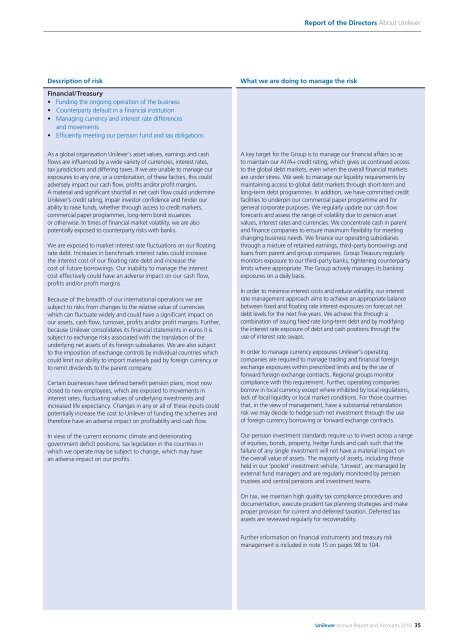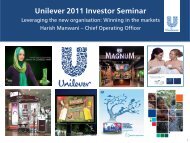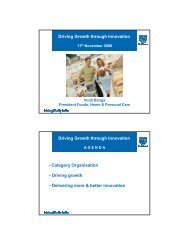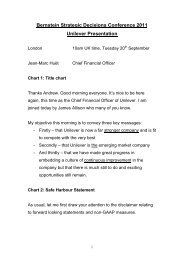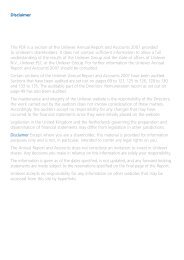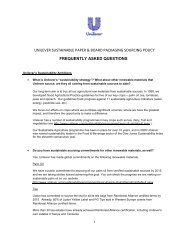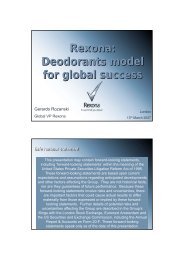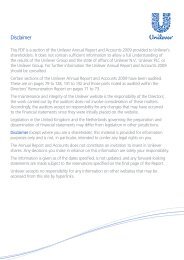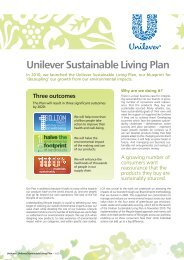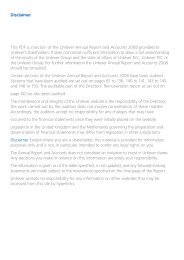Annual Report & Accounts 2010: Outlook and risks - Unilever
Annual Report & Accounts 2010: Outlook and risks - Unilever
Annual Report & Accounts 2010: Outlook and risks - Unilever
Create successful ePaper yourself
Turn your PDF publications into a flip-book with our unique Google optimized e-Paper software.
Description of risk What we are doing to manage the risk<br />
Financial/Treasury<br />
• Funding the ongoing operation of the business<br />
• Counterparty default in a financial institution<br />
• Managing currency <strong>and</strong> interest rate differences<br />
<strong>and</strong> movements<br />
• Efficiently meeting our pension fund <strong>and</strong> tax obligations<br />
As a global organisation <strong>Unilever</strong>’s asset values, earnings <strong>and</strong> cash<br />
flows are influenced by a wide variety of currencies, interest rates,<br />
tax jurisdictions <strong>and</strong> differing taxes. If we are unable to manage our<br />
exposures to any one, or a combination, of these factors, this could<br />
adversely impact our cash flow, profits <strong>and</strong>/or profit margins.<br />
A material <strong>and</strong> significant shortfall in net cash flow could undermine<br />
<strong>Unilever</strong>’s credit rating, impair investor confidence <strong>and</strong> hinder our<br />
ability to raise funds, whether through access to credit markets,<br />
commercial paper programmes, long-term bond issuances<br />
or otherwise. In times of financial market volatility, we are also<br />
potentially exposed to counterparty <strong>risks</strong> with banks.<br />
We are exposed to market interest rate fluctuations on our floating<br />
rate debt. Increases in benchmark interest rates could increase<br />
the interest cost of our floating rate debt <strong>and</strong> increase the<br />
cost of future borrowings. Our inability to manage the interest<br />
cost effectively could have an adverse impact on our cash flow,<br />
profits <strong>and</strong>/or profit margins.<br />
Because of the breadth of our international operations we are<br />
subject to <strong>risks</strong> from changes to the relative value of currencies<br />
which can fluctuate widely <strong>and</strong> could have a significant impact on<br />
our assets, cash flow, turnover, profits <strong>and</strong>/or profit margins. Further,<br />
because <strong>Unilever</strong> consolidates its financial statements in euros it is<br />
subject to exchange <strong>risks</strong> associated with the translation of the<br />
underlying net assets of its foreign subsidiaries. We are also subject<br />
to the imposition of exchange controls by individual countries which<br />
could limit our ability to import materials paid by foreign currency or<br />
to remit dividends to the parent company.<br />
Certain businesses have defined benefit pension plans, most now<br />
closed to new employees, which are exposed to movements in<br />
interest rates, fluctuating values of underlying investments <strong>and</strong><br />
increased life expectancy. Changes in any or all of these inputs could<br />
potentially increase the cost to <strong>Unilever</strong> of funding the schemes <strong>and</strong><br />
therefore have an adverse impact on profitability <strong>and</strong> cash flow.<br />
In view of the current economic climate <strong>and</strong> deteriorating<br />
government deficit positions, tax legislation in the countries in<br />
which we operate may be subject to change, which may have<br />
an adverse impact on our profits.<br />
<strong>Report</strong> of the Directors About <strong>Unilever</strong><br />
A key target for the Group is to manage our financial affairs so as<br />
to maintain our A1/A+ credit rating, which gives us continued access<br />
to the global debt markets, even when the overall financial markets<br />
are under stress. We seek to manage our liquidity requirements by<br />
maintaining access to global debt markets through short-term <strong>and</strong><br />
long-term debt programmes. In addition, we have committed credit<br />
facilities to underpin our commercial paper programme <strong>and</strong> for<br />
general corporate purposes. We regularly update our cash flow<br />
forecasts <strong>and</strong> assess the range of volatility due to pension asset<br />
values, interest rates <strong>and</strong> currencies. We concentrate cash in parent<br />
<strong>and</strong> finance companies to ensure maximum flexibility for meeting<br />
changing business needs. We finance our operating subsidiaries<br />
through a mixture of retained earnings, third-party borrowings <strong>and</strong><br />
loans from parent <strong>and</strong> group companies. Group Treasury regularly<br />
monitors exposure to our third-party banks, tightening counterparty<br />
limits where appropriate. The Group actively manages its banking<br />
exposures on a daily basis.<br />
In order to minimise interest costs <strong>and</strong> reduce volatility, our interest<br />
rate management approach aims to achieve an appropriate balance<br />
between fixed <strong>and</strong> floating rate interest exposures on forecast net<br />
debt levels for the next five years. We achieve this through a<br />
combination of issuing fixed rate long-term debt <strong>and</strong> by modifying<br />
the interest rate exposure of debt <strong>and</strong> cash positions through the<br />
use of interest rate swaps.<br />
In order to manage currency exposures <strong>Unilever</strong>’s operating<br />
companies are required to manage trading <strong>and</strong> financial foreign<br />
exchange exposures within prescribed limits <strong>and</strong> by the use of<br />
forward foreign exchange contracts. Regional groups monitor<br />
compliance with this requirement. Further, operating companies<br />
borrow in local currency except where inhibited by local regulations,<br />
lack of local liquidity or local market conditions. For those countries<br />
that, in the view of management, have a substantial retranslation<br />
risk we may decide to hedge such net investment through the use<br />
of foreign currency borrowing or forward exchange contracts.<br />
Our pension investment st<strong>and</strong>ards require us to invest across a range<br />
of equities, bonds, property, hedge funds <strong>and</strong> cash such that the<br />
failure of any single investment will not have a material impact on<br />
the overall value of assets. The majority of assets, including those<br />
held in our ‘pooled’ investment vehicle, ‘Univest’, are managed by<br />
external fund managers <strong>and</strong> are regularly monitored by pension<br />
trustees <strong>and</strong> central pensions <strong>and</strong> investment teams.<br />
On tax, we maintain high quality tax compliance procedures <strong>and</strong><br />
documentation, execute prudent tax planning strategies <strong>and</strong> make<br />
proper provision for current <strong>and</strong> deferred taxation. Deferred tax<br />
assets are reviewed regularly for recoverability.<br />
Further information on financial instruments <strong>and</strong> treasury risk<br />
management is included in note 15 on pages 98 to 104.<br />
<strong>Unilever</strong> <strong>Annual</strong> <strong>Report</strong> <strong>and</strong> <strong>Accounts</strong> <strong>2010</strong> 35


